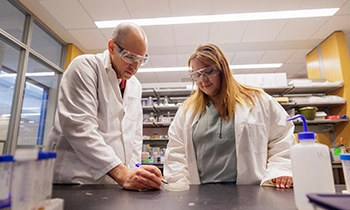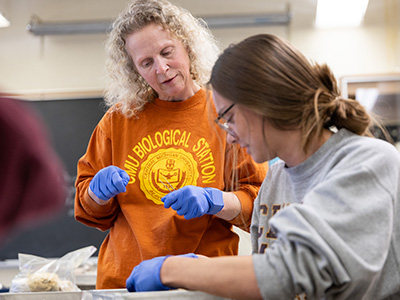Engineering your success: Why you should choose a biotechnology major
Biotechnology is at the front of scientific discovery – it helps solve real-world problems in medicine, agriculture and the environment by combining biology, technology and innovation.
Whether you're just getting started or narrowing your focus, our biotechnology programs can give you skills that will jumpstart your career in the sciences. Start shaping your future now.
What is biotechnology?
Think of it as using life's own toolkit—DNA, proteins, and cells—to build a better future. Biotechnology uses biology to create practical solutions. It uses cellular and biomolecular processes to develop new technologies and products that are used to improve our lives and our planet.

You’re probably already familiar with biotechnology in ways you may not realize – like brewing beer or baking bread. Today’s biotechnology involves taking a simple process – like yeast rising – and using advanced techniques to address today’s challenges.
In most biotechnology majors, you’ll study a mix of subjects including:
- Molecular and cellular biology
- Genetics and genomics
- Chemistry and biochemistry
- Microbiology
- Bioinformatics and data analysis
By studying different subjects, you’ll be prepared to understand complex biological systems and apply what you know in labs.
What can I do with a biotechnology major?
 A bachelors in biotechnology opens doors to a wide array of career paths in healthcare, pharmaceuticals, agriculture, environmental science and forensics.
A bachelors in biotechnology opens doors to a wide array of career paths in healthcare, pharmaceuticals, agriculture, environmental science and forensics.
Many graduates find roles in research and development, quality control, manufacturing and clinical research. Let’s explore some specific jobs you can pursue, with data from the U.S. Bureau of Labor Statistics (BLS).
Biological Technician
As a biological technician, you would work alongside biologists and other scientists, setting up, operating, and maintaining laboratory instruments and equipment. You'll be responsible for monitoring experiments, making observations and calculating and recording results. It’s a hands-on role that puts you right in the middle of scientific discovery.
- Median Pay (2023): $50,530 per year
- Job Outlook (2022-2032): 5% growth (faster than average)
Biomedical Engineer
If you have a passion for both engineering and medicine, this career could be an excellent fit. Biomedical engineers design and create solutions to problems in biology and medicine. This can include anything from developing new diagnostic equipment and artificial organs to creating advanced prosthetic limbs and pharmaceutical drugs. While some roles may require advanced degrees, a bachelor's degree is the typical entry-level education.
- Median Pay (2023): $101,020 per year
- Job Outlook (2022-2032): 5% growth (faster than average)
Biochemist and Biophysicist
Biochemists and biophysicists study the chemical and physical principles of living things and of biological processes. They conduct research to understand how diseases, drugs, and other substances affect biological systems. Many work in basic research to expand scientific knowledge, while others are in applied research, using their findings to develop new products and processes. A bachelor's degree is a starting point, but many research positions require a Ph.D.
- Median Pay (2023): $107,460 per year
- Job Outlook (2022-2032): 7% growth (faster than average)
Other career options
The opportunities don't stop there. A biotechnology major can also prepare you for roles such as:
- Clinical Laboratory Technologist: Performing tests on patient samples to help physicians diagnose and treat diseases.
- Agricultural and Food Scientist: Researching ways to improve the efficiency and safety of agricultural products.
- Quality Control Analyst: Ensuring that pharmaceutical and biotech products meet strict safety and quality standards before they reach consumers.
- Forensic Science Technician: Analyzing evidence from crime scenes, often using DNA and other biological markers.
Picking a biotechnology major
 Biotechnology might be for you if you like asking big questions and using technology to answer them. You can be part of groundbreaking research or create new processes that improve everyday life.
Biotechnology might be for you if you like asking big questions and using technology to answer them. You can be part of groundbreaking research or create new processes that improve everyday life.
Whether you see yourself in a lab, a hospital or a manufacturing facility, this degree provides a solid foundation for a successful and meaningful career.
Biotechnology at CMU
At CMU, you can choose to focus on microscopy or molecular biology as you explore the world of biotechnology. You can start researching in state of the art labs your freshman year on campus while building lasting mentorships with our award-winning faculty.